Summertime means more outdoor play. But, play it safe.
 Sunshine and rising temps can be inviting, but people often have a tendency to overdo it. Common-sense precautions can help prevent heat-related illness and ensure everyone enjoys this season to its fullest.
Sunshine and rising temps can be inviting, but people often have a tendency to overdo it. Common-sense precautions can help prevent heat-related illness and ensure everyone enjoys this season to its fullest.
Taking the heat
Outdoor exercise can be very healthy. It can also place a lot of extra stress on one’s body. Both the exercise itself and the air temperature increase core body temperature, according to Mayo Clinic. To help cool itself, the body sends more blood to circulate through the skin, leaving less blood for the muscles. This, in turn, increases heart rate. When the humidity also is high, and sweat doesn’t readily evaporate from the skin, body temperature can rise even higher.
Whereas skin, blood vessels and perspiration levels generally adjust to heat, the body’s natural cooling systems may fail when exposed to excessive heat and humidity, particularly if one doesn’t consume enough fluids. Heat-related illnesses include:
- Heat cramps.
- Heat syncope (lightheadedness and/or fainting) and exercise-associated collapse.
- Heat exhaustion, including nausea, vomiting, headache, weakness and cold, clammy skin. If left untreated, this can lead to heatstroke.
- Heatstroke, a life-threatening emergency condition that occurs when the body temperature exceeds 104 degrees F (40 C).
Pay attention
Muscle cramps and fatigue are nothing to scoff at when exercising in hot weather. In fact, these – along with the following – are symptoms of heat-related illness and must be dealt with immediately, warns Mayo:
- Nausea/vomiting
- Fatigue
- Headache
- Extensive sweating
- Dizziness/lightheadedness
- Confusion
- Irritability
- Low blood pressure
- Increased heart rate
- Visual problems
There’s no question these symptoms are serious. But they shouldn’t be cause for turning into a summer couch potato. Mayo recommends taking several precautions to help ensure safe exercise in hot weather:
- Keep an eye on weather forecasts and heat alerts and know what the temperature is expected to be for the duration of planned outdoor activity.
- Particularly for those who are used to exercising in cooler weather, start out slow to allow the body to adjust to the heat.
- Those who are unfit or new to exercise should take extra caution – as well as extra breaks – when exercising in high heat.
- Dehydration is a key factor in heat illness. Drink plenty of fluids and stay hydrated.
- Lightweight, loose-fitting clothing permits sweat to evaporate and keeps the body cooler.
- Morning and evening are cooler – and perhaps better – times of the day for outdoor exercise and activity.
- Wearing sunscreen is essential, as sunburn decreases the body’s ability to cool itself, as well as increases the risk of skin cancer.
- Certain medical conditions or medications can lead to an increased risk of heat-related illness.
In extreme weather conditions, it makes sense to work out at an indoor air-conditioned gym.